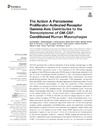Please use this identifier to cite or link to this item:
https://accedacris.ulpgc.es/handle/10553/25487
| Title: | The activin A-peroxisome proliferator-activated receptor gamma axis contributes to the transcriptome of GM-CSF-conditioned human macrophages | Authors: | Nieto, Concha Bragado, Rafael Municio, Cristina Sierra-Filarde, Elena Alonso, Bárbara Escribese, María M. Domínguez-Andrés, Jorge Ardavín, Carlos Castrillo Viguera, Antonio Jesús Vegal, Miguel A. Puig-Kröger, A. Corbí, Angel L. |
UNESCO Clasification: | 32 Ciencias médicas | Keywords: | Transcription factor Macrophage Peroxisome proliferator-activated receptor Inflammation Innate immunity |
Issue Date: | 2018 | Journal: | Frontiers in Immunology | Abstract: | GM-CSF promotes the functional maturation of lung alveolar macrophages (A-MØ), whose differentiation is dependent on the peroxisome proliferator-activated receptor gamma (PPARγ) transcription factor. In fact, blockade of GM-CSF-initiated signaling or deletion of the PPARγ-encoding gene PPARG leads to functionally defective A-MØ and the onset of pulmonary alveolar proteinosis. In vitro, macrophages generated in the presence of GM-CSF display potent proinflammatory, immunogenic and tumor growth-limiting activities. Since GM-CSF upregulates PPARγ expression, we hypothesized that PPARγ might contribute to the gene signature and functional profile of human GM-CSF-conditioned macrophages. To verify this hypothesis, PPARγ expression and activity was assessed in human monocyte-derived macrophages generated in the presence of GM-CSF [proinflammatory GM-CSF-conditioned human monocyte-derived macrophages (GM-MØ)] or M-CSF (anti-inflammatory M-MØ), as well as in ex vivo isolated human A-MØ. GM-MØ showed higher PPARγ expression than M-MØ, and the expression of PPARγ in GM-MØ was found to largely depend on activin A. Ligand-induced activation of PPARγ also resulted in distinct transcriptional and functional outcomes in GM-MØ and M-MØ. Moreover, and in the absence of exogenous activating ligands, PPARγ knockdown significantly altered the GM-MØ transcriptome, causing a global upregulation of proinflammatory genes and significantly modulating the expression of genes involved in cell proliferation and migration. Similar effects were observed in ex vivo isolated human A-MØ, where PPARγ silencing led to enhanced expression of genes coding for growth factors and chemokines and downregulation of cell surface pathogen receptors. Therefore, PPARγ shapes the transcriptome of GM-CSF-dependent human macrophages (in vitro derived GM-MØ and ex vivo isolated A-MØ) in the absence of exogenous activating ligands, and its expression is primarily regulated by activin A. These results suggest that activin A, through enhancement of PPARγ expression, help macrophages to switch from a proinflammatory to an anti-inflammatory polarization state, thus contributing to limit tissue damage and restore homeostasis. | URI: | https://accedacris.ulpgc.es/handle/10553/25487 | ISSN: | 1664-3224 | DOI: | 10.3389/fimmu.2018.00031 | Source: | Frontiers in Immunology [ISSN 1664-3224], v. 9, (31) | Rights: | by-nc-nd |
| Appears in Collections: | Artículos |
SCOPUSTM
Citations
16
checked on Mar 30, 2025
WEB OF SCIENCETM
Citations
15
checked on Mar 30, 2025
Page view(s)
91
checked on Jan 27, 2024
Download(s)
160
checked on Jan 27, 2024
Google ScholarTM
Check
Altmetric
Share
Export metadata
Items in accedaCRIS are protected by copyright, with all rights reserved, unless otherwise indicated.
